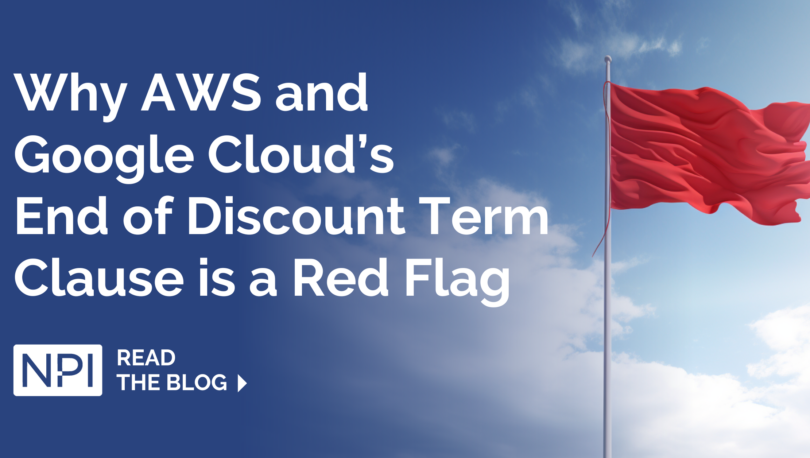Despite the critical nature of IaaS and PaaS, it’s not uncommon for customers of the industry’s largest hyperscalers (e.g. AWS, Azure, Google Cloud) to overlook some of the fine print in contractual business terms. One example is the “end of term” clause in AWS and Google Cloud agreements. The verbiage should set off alarm bells for anyone in enterprise sourcing, legal, or risk management.
Example text from each supplier is illustrated below:
Amazon Web Services (AWS): Term. The term of this Addendum commences on the Addendum Effective Date and ends on the last day of the Discount Term.
Google Cloud: Post Discount Period. If Customer continues to use the Services after the Discount Period, Customer will automatically move to then-current list prices.
Both suppliers make it clear that all discounts and special pricing will revert to then-current published list prices upon expiration of the term. Large enterprise customers could see their costs go up by a staggering 25% to 35% or more.
It’s Not Just Cost Risk – It’s Leverage
The negative implications of these end-of-term clauses go beyond a jump in cost. The clauses effectively give all the leverage to AWS and Google Cloud as a contract comes due for renewal. An enterprise customer with significant spend on either platform will either risk what AWS or Google Cloud offers (which typically comes in the form of greater spend and vendor entrenchment) or risk reverting to list prices.
This approach is very different compared to traditional data center outsourcing agreements. Those agreements typically had specific clauses on how to handle the end of term. For example, on a five-year outsourcing or managed services agreement, the contract typically defined PxQ pricing (price multiplied by quantity) for an extended term. Additionally, they often included a clause for transitions in the event the client did not renew for a new term. The transition clause would also define PxQ pricing and support for a negotiated period of time following the end of term to allow smooth transition to a different provider.
Pushing Back on AWS and Google Cloud’s End of Discount Term Clause
Thus far, AWS and Google Cloud have shown little flexibility in amending the clause. NPI recommends all enterprise customers challenge AWS and Google Cloud on the clause, especially before committing to a significant spend. To negotiate effectively, customers need to be prepared to offer a substitute. If more customers begin to press on this issue, the vendors may begin to address it.
One suggestion is to require all discounts and special pricing continue to be in effect on a month-to-month term as long as the customer and vendor continue to negotiate in good faith on a new Discount Term. If the parties can’t agree within a negotiated period of time, the discounts and special pricing could remain in effect for a transition period regardless of monthly spend.
Sourcing with AWS and Google Cloud – Expert Negotiation, Careful Optimization Required
Just like outsourcing contracts, contractual business terms for cloud purchases and renewals must be carefully optimized. This is becoming increasingly important as large enterprises increase their cloud usage, and as hyperscalers seek ways to increase profits and grow market share.
AWS and Google Cloud’s end-of-term clause is just one example of revenue strategy tactics cloud providers use to stay two steps ahead of customers. And one example of why it’s absolutely necessary for customers to negotiate contractual business terms that optimize cost and flexibility alongside current- and future-state requirements.
Negotiating an enterprise-scale agreement with AWS, Google Cloud or Microsoft? NPI’s IT sourcing experts can help. Contact us.
Related Content
- Bulletin: How to Negotiate and Spend Smarter with Amazon Web Services (AWS)
- Blog: Cloud Cost Management: What Are You Missing?
- Video: Cloud Sourcing – A Topics in Technology Panel Discussion
- NPI Service: Enterprise Software License Optimization Consulting
- NPI Service: IT Price Benchmark Analysis & Contract Negotiation Inte
